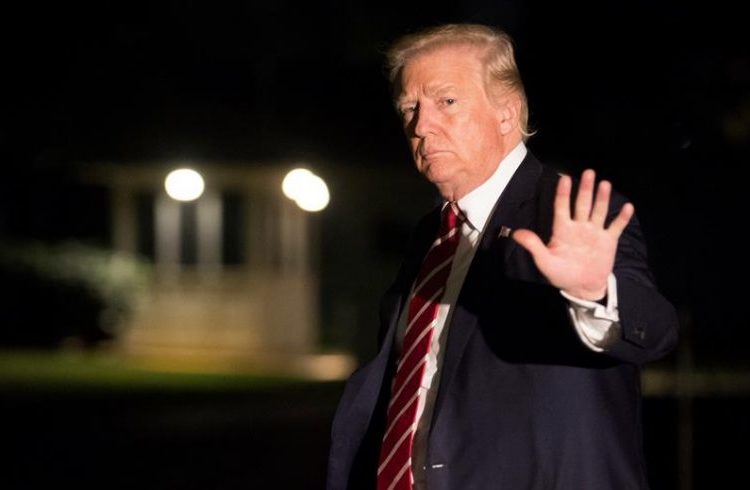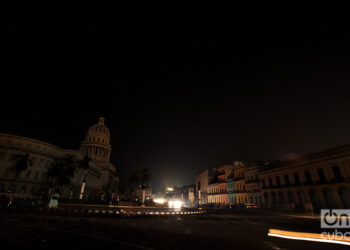The image of Donald Trump throwing rolls of toilet paper to Puerto Rico’s population and the news that the Department of State will appropriate (much more than wrongly) the moneys of many Cubans who paid for their right to an interview to try to get a U.S. visa, made me change the theme of my column of this week, which was practically written. It was my friend Goyo who definitively drove me to do so with an apparently naïve question: “Hey, prof, what’s that about the essence, because I believe there are people who seem to only live in that place?”
While after December 17, 2014 the debate in Cuba about relations between our country and the United States became more open and undoubtedly more acute and diverse, after Obama’s visit to Cuba that debate took on colors and tones that were frequently very harsh.
For a part of those who participated in that debate Obama had barely introduced some small variation that in no way changed the “last essence” of the already historic and well-known U.S. policy toward Cuba. Others perceived it as the possibility of starting a sort of honeymoon with that large neighbor. Among both positions there were and have been a range of others that combined them and combined each other. Around those days there was no lack of overt and covert qualifying adjectives from one side and the other that today are heard once and again in the daily discussions in our country.
The truth is that it seemed the start of the end of that obsolete and retrograde position and it evidently was, in the U.S. president’s words, the recognition of the defeat of the policy maintained by all the previous administrations, even his during his first term in office.
The other day I heard a Cuban “expert” say there were no essential differences between Trump’s policy toward Cuba and Obama’s policy (it was the same thing my friend Goyo heard and which gave rise to his question). And perhaps that expert has all the reason in the world, deep down, in the very depth of the phenomenon, it is possible that there are no essential differences, but the road from the apparent to the essence and vice versa is very long and the forms in which the essence is manifested can be very varied. Even further: those different forms of manifestation can have and have a different impact not just on daily matters, but also on longer-term phenomena.
If we want some verification regarding this we just have to ask our tourist sector if those hundreds of thousands of tourists who can stop arriving to Cuban hotels have some meaning or not. We can ask the same question to those who rent homes and we can repeat it to the store chains selling in hard currency that today live to a great extent thanks to the remittances, the same that can be seriously affected by Mr. Trump’s government?
I’m one of those convinced that while the essence can be the same, there are substantial differences between that policy begun by Obama and this other one designed by Marco Rubio and implemented by his debtor, the president of the United States. And those non-essential differences do count for our country, for our people and for the aims of advancing in our aspirations of development.
I believe that uncertainty is the first objective and first effect of that policy in relations between both countries. While the Obama government at the end of his mandate transmitted certainty about its projection toward Cuba, Mr. Trump, who has become the “manager” of uncertainty on a global scale, casts many question marks about those relations. It is, in my opinion, well thought out. If Cuba needs a better business environment, if part of that environment is influenced by its relations with other countries, if somehow relations between Cuba and the United States influence that “environment,” then the best way to attack Cuba and try to hinder that purpose of ours is to generate uncertainty.
And how much does the uncertainty cost? Well, it is not known, it is difficult to calculate and no matter how well you do it, it will always be a very questionable figure. The cost of the uncertainty can be estimated like the sum of the opportunities lost plus others not generated, and there would still remain other factors to include in that equation.
Uncertainty affects everything; it affects the Cuban state-run and non-state tourist sector, since the performance of one of its “natural” markets (the United States) has become, by virtue of Donald, something difficult to predict. It thus affects the capacity to drag that sector toward the rest of the economy, it affects the Cuban private sector, not just those who have a home and car rental business or restaurants, but the entire sector as a whole and generates expectations on the low impact it can have on that sector’s decisions of investment, investments that moderately estimated can reach 35%-40% of the remittances the country receives today – this is, between 240 and 400 million dollars – with a very negative impact on the added demand and on the capacity to generate employment of the non-state sector (which today employs more than 40% of the workforce employed in the country).
To those who think that Donald Trump’s changes in the Cuba policy are non-essential, I urge them to pay attention to these numbers of lost opportunities, not created or wasted. To those who today still think that Cuba’s struggle against the blockade is an obstinacy of the Cuban government, I also urge them to add up the figures that year after year Cuba shows, these other ones so difficult to calculate but that count every day in the daily life of the Cuban people.
And what can we do then? While unilateral actions of a foreign government against Cuba by the government of the world’s most powerful country, reducing the uncertainty is, in my opinion, one of the best antidotes.
In short Cuba will have that possibility. In late October and early November the Havana International Trade Fair (FIHAV 2017) will be held in the Cuban capital. It will be held in conditions very different to those of last year. The change in relations with the United States is not the only change, but it is one of the most transcendental.
Creating and offering better facilities to foreign investors and businesspeople is one of the ways to reduce the uncertainty. On more than one occasion the Cuban authorities have recognized at the highest level that the slowness and lack of expertize, together with minds stagnant in their way of viewing foreign investment, have been among the causes of the low volumes of foreign investment executed in the country, which places us in some indicators related to this matter behind practically all the region’s countries. Let’s do it then, let’s radically change those “domestic obstacles” that have not allowed to “essentially” change our way of relating with foreign direct investment.
But let us not neglect our strengths, let’s also let our state enterprises be real enterprises, but let’s also make the non-state sector a real strength for our aspirations. Let’s not understand them as watertight compartments, because they are not. Let’s view them as complementary, both of them.
Trump has come to join those U.S. presidents also prisoners of an also stagnant way of understanding relations with Cuba. He gave up out of ignorance and for being the debtor of Marco Rubio on the focus put into practice by the Obama administration. I don’t believe he will change that line of behavior in the next three years; at the most he will worsen that relationship and will generate more uncertainty. He betrays his own arguments about his interest in U.S. companies, his protectionist policy and his arguments in favor of creating employment in the country.
But undoubtedly it has a positive side. It reminds us that it is the strengths of all the Cubans what will allow us to defeat the tremendous madness of this new policy. We Cubans are trained in that tremendous enterprise that is surviving under exceptional conditions. Let’s then take advantage of the opportunities. They are there, but they don’t wait.










